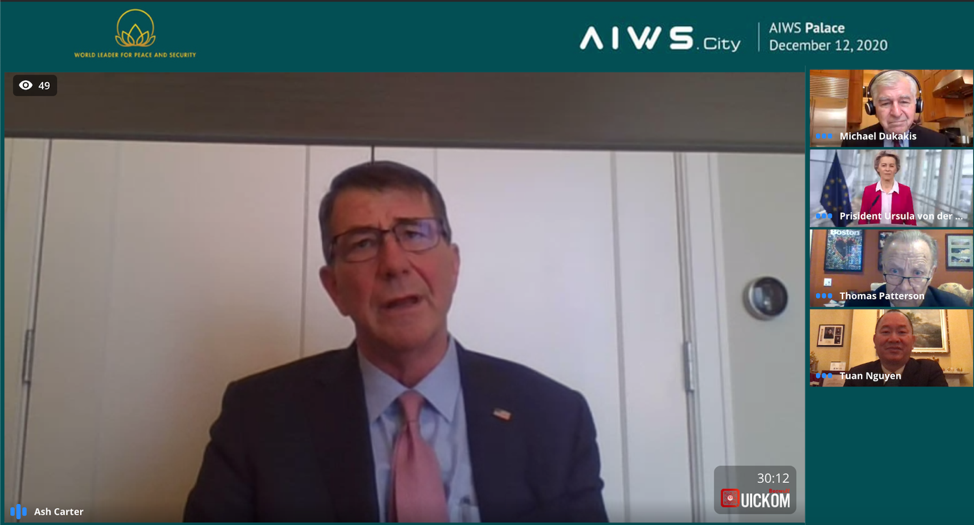
by Editor | Nov 4, 2022 | News
Boston, October 25, 2022
We were deeply saddened to learn of the recent death of Ash Carter, the former United States Secretary of Defense, who was an important contributor to Boston Global Forum (BGF)’s work on cybersecurity and peace.
In 2020, Secretary Carter addressed the BGF Global Cybersecurity Day Forum to speak about the technological risks posed by cyberthreats mounted by state and non-state actors. The Secretary’s background as a technology specialist and diplomat provided an important perspective for participants as we assessed the use technological tools in conflict situations. He stressed the importance of addressing these threats to multilateral organizations and non-profit groups with expertise on these issues.
Secretary Carter was a distinguished contributor to the book Remaking the World – Toward an Age of Global Enlightenment is a joint initiative by the Boston Global Forum and the United Nations Academic Impact as part of the United Nations Centennial Initiative.
The book proposes pathways toward a more humane, peaceful, and secure world, largely by harnessing the potential of Artificial Intelligence (AI), blockchain, and other Digital Age technologies. A key proposal is the adoption of an AI International Accord that would bind nations to constructive uses of AI and prohibit destructive uses. In addition, Remaking the World – Toward an Age of Global Enlightenment advances the Social Contract for the AI Age as the theoretical and ethical foundation of the Accord. The book also proposes the AI World Society (AIWS) as a vehicle through which individuals and civic organizations can help foster an Age of Global Enlightenment.
The Boston Global Forum executive team and leadership extends our condolences to the family and friends of Secretary Ash.

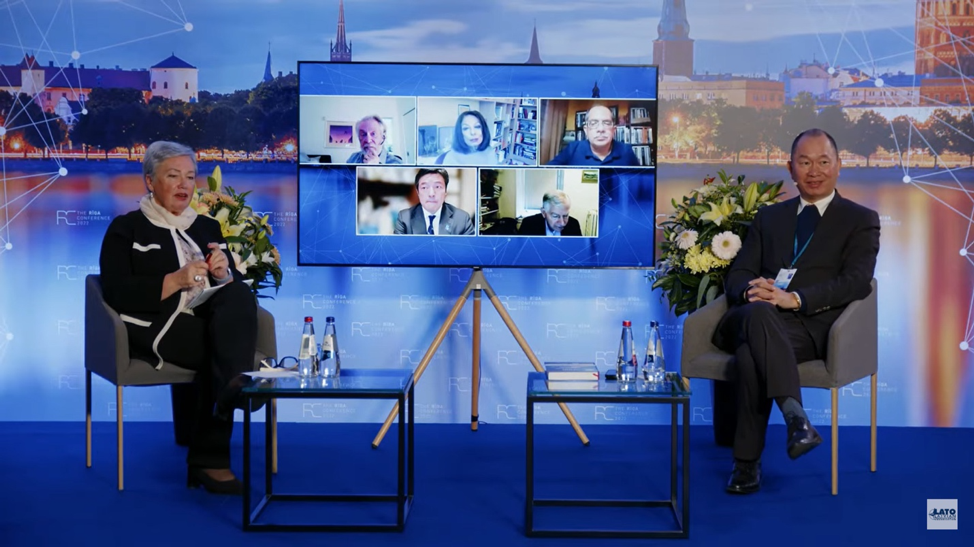
by Editor | Oct 30, 2022 | Global Alliance for Digital Governance
- Introduction
Technology has changed everything.
We are all technologists, as we use devices that help us receive and process information throughout our daily lives. Every interaction with the outside world, related to health, well-being, learning, finance, economics, relationships, involves technology in some way.
While technology has improved life and made many things more convenience and effective, it has had negative consequences that must the addressed and remedied. In politics especially, there are new threats and real dangers to world peace driven by technological tools and strategies: religious extremism, racism and ethnic divisions, authoritarianism and totalitarianism, extreme nationalism. The most powerful countries suffer from these problems and grapple with solutions.
- The Global Enlightenment Age
There are existing structures and networks that are serving to guide us to a better place. The United Nations Academic Impact and Boston Global Forum founded the United Nations Centennial Initiative and published the book “Remaking the World – Toward an Age of Global Enlightenment” in May 2021. Numerous forums, non-profit groups, conferences and high-level discussions have begun to counter the rise of technological malfeasance. The ‘Remaking the World” book outlines the potential for an Age of Global Enlightenment, potentially a much more peaceful, secure, and lawful age of humankind.
- Models and concepts of “Tech for peace and security in the Global Enlightenment Age”
These high-level discussions among the world’s leading thinkers have developed concepts that can be used to deploy technology in the service of world peace and security, including cybersecurity:
- Technology helps people to access truth, justice, rationality, norms, standards, and
- Technology must support the reduction of threats and dangers to world peace;
- Technology must assist in building a just world, where truth and accurate perception is a fundamentally respected value;
- Political leaders who manipulate information and technology to spread lies, undermine respect for the Rule of Law and Freedom of the Press should be identified and discouraged from participating in civic life;
- Laws and regulations for digital technologies must be developed and implemented in an unbiased fashion to minimize the negative impacts of technology;
- Respect for privacy in the public and private spheres should be paramount in developing policies;
- Technology must be harnessed to assist in building an Innovative, Smart Economy, enabling opportunities for every person to become an innovator;
Technology must be directed to enable individuals to become more knowledgeable and active participants in local, national and international civic and political life;
Model for Discussion:
Two groundbreaking works outline the promise of AI in the future as a core strategy and tool for ensuring peace and security:
- Potential Solutions for implementation
AIWS proposes the following steps to help resolve emerging issues
- Building the capacity of Pillar Countries as a paragon and practical model: Initially the Four Pillars are: United States, European Union countries, Japan, India
- South Korea, the United Kingdom, Sweden, Finland, Australia, Canada, Singapore are the next tier of Pillar Countries;
- Encourage and assist other nations, such as South Africa, Chile and others, to join Pillars community;
- Strengthen and propagate the Global Alliance for Digital Governance (GADG) to coordinate in this mission. GADG can supervise the process, making sure data is not biased, and conducting campaigns to fight disinformation and misinformation;
- Building the capacity of AIWS.net, a global community of distinguished people, organizations and institutions to implement, help bring into practice the Manifesto under the guidance of the GADG.
- Encourage and respect all contributions from any people to apply and build the Global Enlightenment Age through AIWS.net. All meaningful contributions will be recognized and introduced on AIWS.net.
- Establishing a Group of Global Enlightenment Leaders to lead this mission.
- Help to build AIWS City, a digital city, to recognize, honor, hold and share information about achievements.
- AIWS City is a place to organize events and conferences to apply the Manifesto and build the Global Enlightenment Age;
- Building tech solutions in order to contribute, assist and help in bringing education to all people, especially in developing countries. This is a fundamental solution to reduce extreme nationalism and religion;
- We will assist in building a special education program (Innovation Education Program in the Global Enlightenment Age) to educate people in the world to have awareness and perceptions about the Global Enlightenment Age and their opportunities, obligations and responsibilities;
- We call for public-private cooperation to find tech solutions to manage threats, dangers to world peace from extreme nationalism from major countries and religious extremism;
- Every nation must help build the Innovation Community Economy: Every person can be an innovator;
- We call on the United Nations and all countries to support and implement this Program.

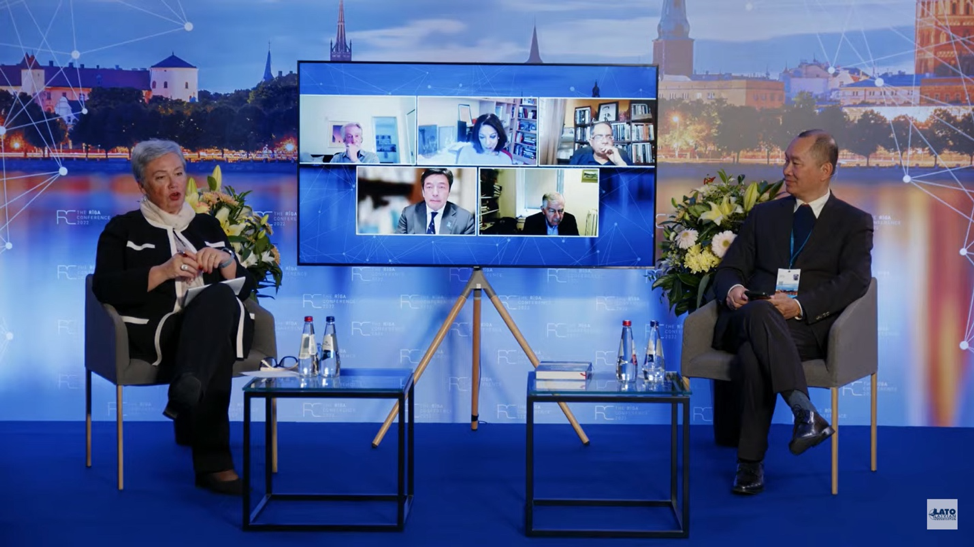
by Editor | Oct 23, 2022 | News
Global Enlightenment Leaders: Governor Michael Dukakis, BGF’s CEO Nguyen Anh Tuan, MIT professors Alex Sandy Pentland and Nazli Choucri, Chairwoman of the Latvian Transatlanic Organization (LATO) Zaneta Ozolina, and former Japanese State Minister of Defense Yasuhide Nakayama, spoke at the Session “US-EU-Japan-India: the Pillars for world peace and security” at the Riga Conference 2022. Some highlights of the initiative are:
- Concepts:
- To create innovative and technologically advanced economies as models for the world. They are pillars of innovation and the tech economy.
- To uphold the norms, standards, and values required for world peace and security
- To apply and expand the norms, standards, and values to nations who accept the opportunity, commitment, and values that they represent.
- Roles, voices, impacts, decisions of each pillar depend on their contributions in building US-EU-Japan-India Pillars for World Peace and Security, and then apply and expand to nations who accepts this model and paradigm to join and become a Pillar nation for World Peace and Security.
- Fundamental:
- Standards, Norms and Values: As provided by UN conventions and the Boston Global Forum’s Social Contract for the AI Age and AIWS Values
- Economy:
- US-EU-Japan-India Pillars dominate tech and innovative economy.
- Every individual become innovators in the Global Enlightenment Age. Communities and citizens as sources of innovation
- Building innovation communities of these Pillars. Create a new economy model of collaboration public-private for maximum resources, faster, smarter, more effective and more innovative. Economic system rooted in public-private collaboration to encourage innovation and expand applications of technology.
- Protect peace and security:
- Support and respect for sovereignty and territorial integrity, and cyber security of all nations.
- Promote and protect standards and values between pillars and in all nations.
- Education:
- Create the Innovation Program in the Global Enlightenment Age for all people:
- Social Contract for the AI Age and AIWS Values
- World History: concise, true, independent, and scientific
- Innovation ecosystem where everyone can become an innovator. Strengthen communities and individuals’ capacity for innovation
- Art and Music: Symphonies and Chamber Music, art and music for Peace and Reconciliation
- Deepen respect for and understanding of nations’ cultures, histories, and peoples

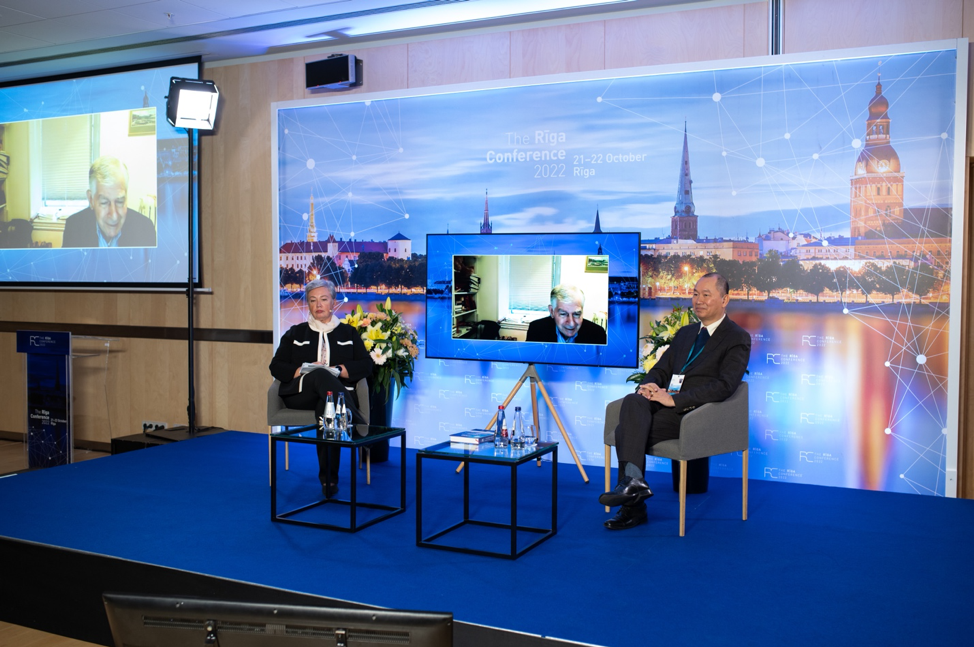
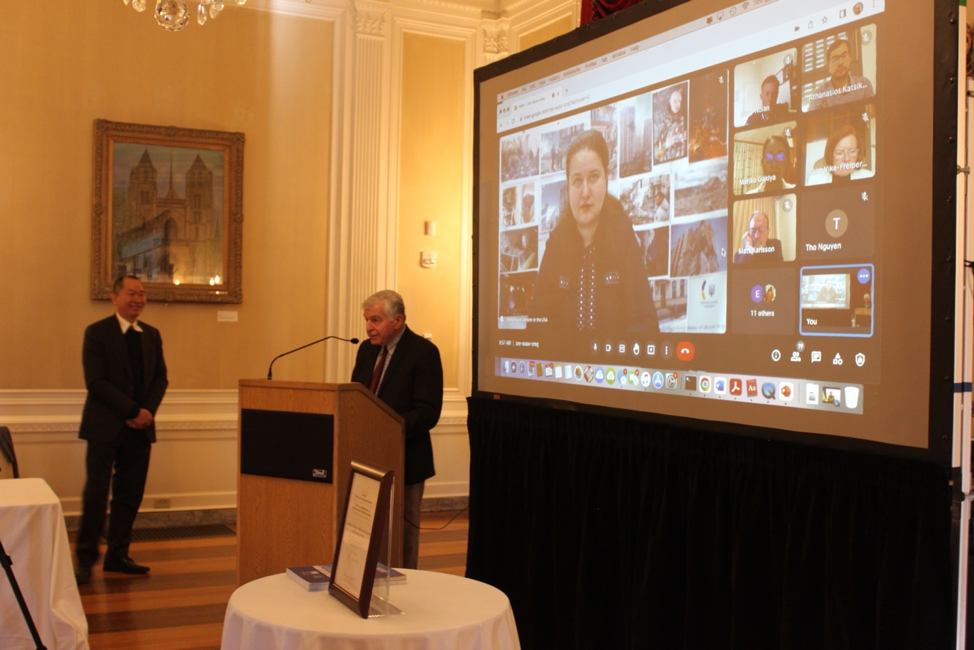
by Editor | Oct 16, 2022 | Global Alliance for Digital Governance
By Michael Dukakis, Nguyen Anh Tuan, Alex Pentland
Artificial intelligence (AI) and automated systems are increasingly affecting our daily lives. Banking algorithms decide who is eligible for housing or financial loans, healthcare algorithms are making decisions on coverage and standard of care. Companies are using hiring algorithms to sort resumes for potential employees. While all of these innovations make life more convenient, they pose risks to the public and are often rife with bias and discrimination.
Further, there has been substantial investment in the development and adoption of AI, but nowhere near as much money or energy has been put toward safeguards or protection, regulations or even a standard code of ethics.
Earlier this month, the White House Office of Science and Technology Policy (OSTP) released a “Blueprint for an AI Bill of Rights,” one that aims to ensure the use of AI is fair, equitable and nondiscriminatory. As members of the Boston Global Forum, we applaud President Biden and the OSTP for advancing this important measure which protects people from threats and defines guardrails on technology to reinforce civil rights, civil liberties and privacy, and equal opportunities ensuring access to critical resources and services.
The Blueprint outlines five common-sense protections with respect to AI to which all citizens should be entitled:
- AI should be safe and effective;
- It shouldn’t discriminate;
- It shouldn’t violate data privacy;
- We should know when AI is being used;
- We should be able to opt out and talk to a human when we encounter a problem.
It’s not binding legislation, but rather a set of recommendations for government agencies and technology companies using AI. It’s also a great tool to educate the public as well as organizations responsible for protecting and advancing our civil rights and civil liberties.
This is a necessary first step for our country, but the effort must be a global one.
On the world stage, bad actors in other nations are increasingly using AI to spread disinformation and propaganda through deep fakes and other manipulated media – all of which are in direct conflict to the values of democracy and freedom.
Last year, the Boston Global Forum and World Leadership Alliance – Club de Madrid brought prominent international leaders together to explore ideas and strategies and for a Global Law and Accord on Artificial Intelligence and Digital Rights.
The group established the Global Alliance for Digital Governance (GADG) to coordinate resources among governments, international organizations, corporations, think tanks, civil society and influencers for AI and a digital sphere for good, to make the resources more effective to synthesize and maximize their impact. It is not an organization, but rather, a network for sharing resources and cooperating among governments. At the core of this imperative is to establish a common understanding of policy and practice, anchored in general principles to help maximize the “good” and minimize the “bad” associated with AI:
- Fairness and justice for all: The first principle is already agreed upon in the international community as a powerful aspiration. It is the expectation of all entities – private and public – to treat, and be treated, with fairness and justice.
- Responsibility and accountability for policy and decision making —private and public: The second principle recognizes the power of the new global ecology that will increasingly span all entities worldwide—private and public, developing and developed.
- Precautionary principle for innovations and applications: The third principle is well established internationally. It does not impede innovation but supports it. It does not push for regulation but supports initiatives to explore the unknown with care and caution.
- Ethics-in-AI: Fourth is the principle of ethical integrity—for the present and the future. Different cultures and countries may have different ethical systems, but everyone, everywhere recognizes and adopts some basic ethical precepts. At issue is incorporating the commonalities into a global ethical system for all phases, innovations, and manifestations of artificial intelligence
At home and abroad, we must move toward a framework, an ecosystem, and a social contract for the AI age. Without adequate guidelines and useful directives, the undisciplined use of AI poses risks to the wellbeing of individuals and creates fertile ground for economic, political, social, and criminal exploitation. As we gain consensus on principles and practices among members of the global society, we will generate and enhance social benefits and wellbeing for all, shared by all.

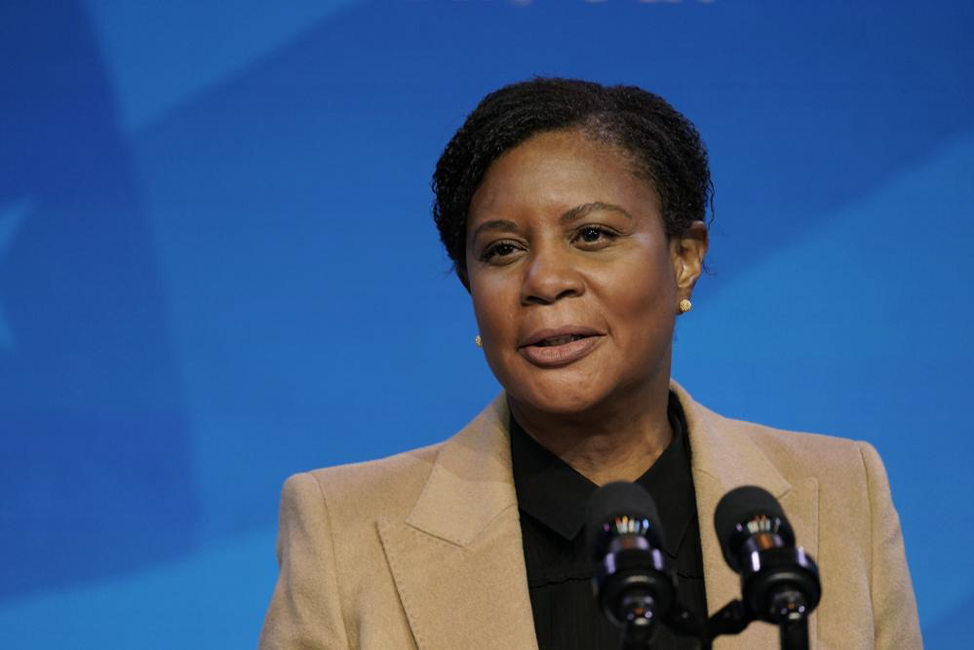
by Editor | Oct 9, 2022 | Global Alliance for Digital Governance
President Joe Biden on October 4 unveiled a new AI Bill of Rights, which outlines five protections Americans should have in the AI age, making automated systems work for the American people.
Boston Global Forum is pioneering by presenting a proposal and call for International Law and Accord in AI and Digital Rights at the Policy Lab: “FUNDAMENTAL RIGHTS IN AI & DIGITAL SOCIETIES – TOWARDS AN INTERNATIONAL ACCORD,” co-organized by BGF and Club de Madrid on September 7-9, 2021. BGF also published “Remaking the World – Toward an Age of Global Enlightenment,” which includes these important chapters: “Framework for an AI International Accord” by MIT Professor Nazli Choucri, “An AI ‘Bill of Rights’ in the Digital Age” by Ambassador Stavros Lambrinidis, and “Fundamentals of International Law: AI and Digital” by Paul Nemitz; and the special report of BGF and Club de Madrid (CdM) in 2021 with highlights below:
CdM in partnership with BGF organized a Policy Lab on Fundamental Rights in AI & Digital Societies: Towards an International Accord in September 2021. Multistakeholder discussions aimed to build consensus around a rights-based agenda for the global governance of AI and digital societies, focusing on the following topics:
- Opportunities and threats for fundamental rights in AI & digital societies.
- Transatlantic approaches to protect fundamental rights in AI & digital spaces.
- The elements & processes for an international legal framework to protect fundamental rights in AI & digital spaces
- The Concept, Principle and Ecosystem for Digital and AI Society – “Remaking the World, Toward an Age of Global Enlightenment”.
- The Global Alliance for Digital Governance
- A framework for a global law and accord on AI and digital tools The Policy Lab followed the work initiated by both organizations on the implications of digital technologies and AI for democracy, global cooperation and multilateralism, with a particular focus on the Transatlantic space, and based on the progress of the AIWS Social Contract 2020 (Social Contract for the age of AI) and AIWS Innovation Network (AIWS.net).
Here is the link of the book “Remaking the World – Toward an Age of Global Enlightenment.”
Here is the link to the report.
Firstly, BGF will connect governments of the EU, US, Japan and India to discuss about International AI Bill of Rights, then expand to the UK, Australia, South Korea and Brazil.

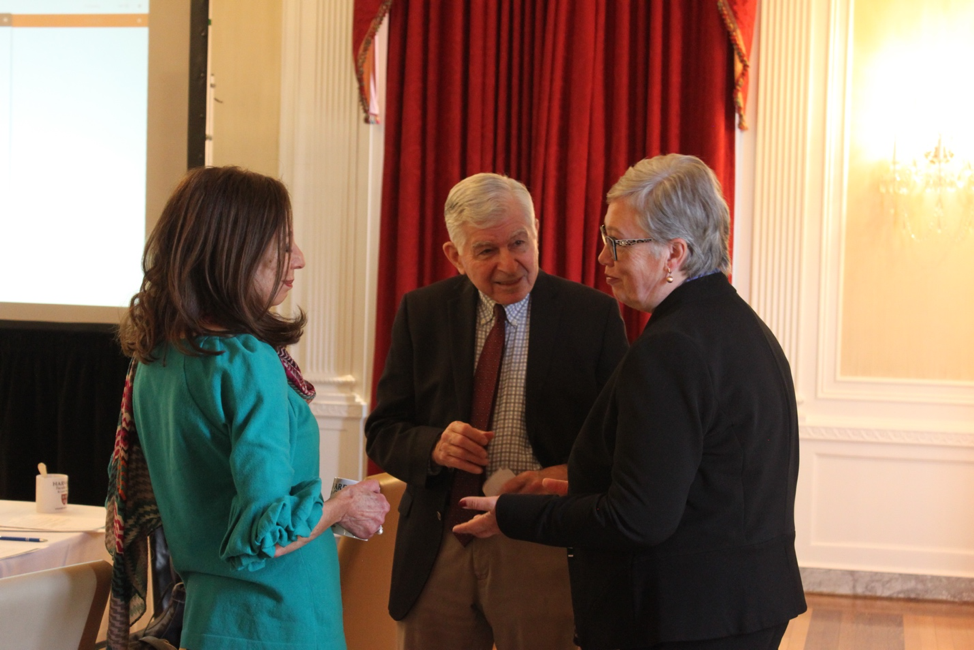
by Editor | Oct 2, 2022 | Global Alliance for Digital Governance
Over the past two years, the National Cyber Power Index (NCPI) has catalysed conversations and debate between policymakers, academia, and industry on the concept of cyber power and how states are and can further harness their capabilities to enhance their overall ability to achieve national objectives.
Harnessing a state’s cyber power requires a whole-of-nation approach. National governments should not just be concerned about destructive operations, espionage, or enhancing its cyber resilience, but also other state’s efforts at surveillance, information control, technology competition, financial motivations, and shaping what is acceptable and possible through norms and standards.
The Global Alliance for Digital Governance (GADG) was established through a collaboration of the Boston Global Forum and World Leadership Alliance-Club de Madrid at the Policy Lab on September 7-9, 2021.
GADG do:
Coordinate resources: governments, international organizations, corporations, think tanks, civil society, and influencers for AI and a digital sphere for good, to make these resources more effective, to synthesize and maximize their impact, and to create more implementation-oriented conferences.
Protect fundamental values and standards proposed in Social Contract for the AI Age, in AI International Accord and in the book Remaking the World – Toward an Age of Global Enlightenment.
https://www.belfercenter.org/publication/national-cyber-power-index-2022

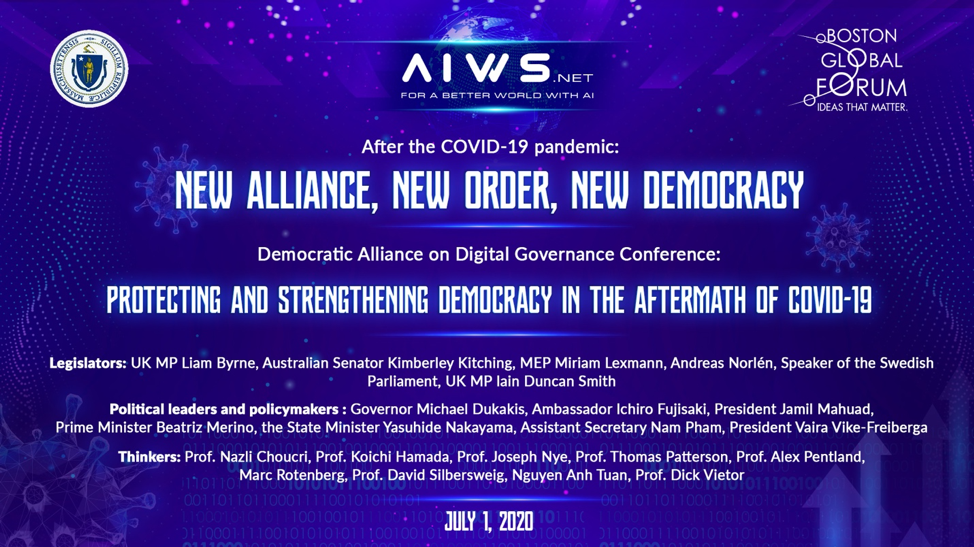
by Editor | Sep 18, 2022 | Global Alliance for Digital Governance
The National Institute of Standards and Technology (NIST) has released the second draft of its Artificial Intelligence (AI) Risk Management Framework (RMF) for comment. Comments are due by September 29, 2022.
The AI RMF was designed and is intended for voluntary use to address potential risks in “the design, development, use and evaluation of AI products, services and systems.” NIST envisions the AI RMF to be a “living document” that will be updated regularly as technology and approaches to AI reliability to evolve and change over time.
The Global Alliance for Digital Governance (GADG) was established through a collaboration of the Boston Global Forum and World Leadership Alliance-Club de Madrid at the Policy Lab on September 7-9, 2021.
GADG do:
Coordinate resources: governments, international organizations, corporations, think tanks, civil society, and influencers for AI and a digital sphere for good, to make these resources more effective, to synthesize and maximize their impact, and to create more implementation-oriented conferences.
Protect fundamental values and standards proposed in Social Contract for the AI Age, in AI International Accord and in the book Remaking the World – Toward an Age of Global Enlightenment.
https://www.nist.gov/system/files/documents/2022/08/18/AI_RMF_2nd_draft.pdf

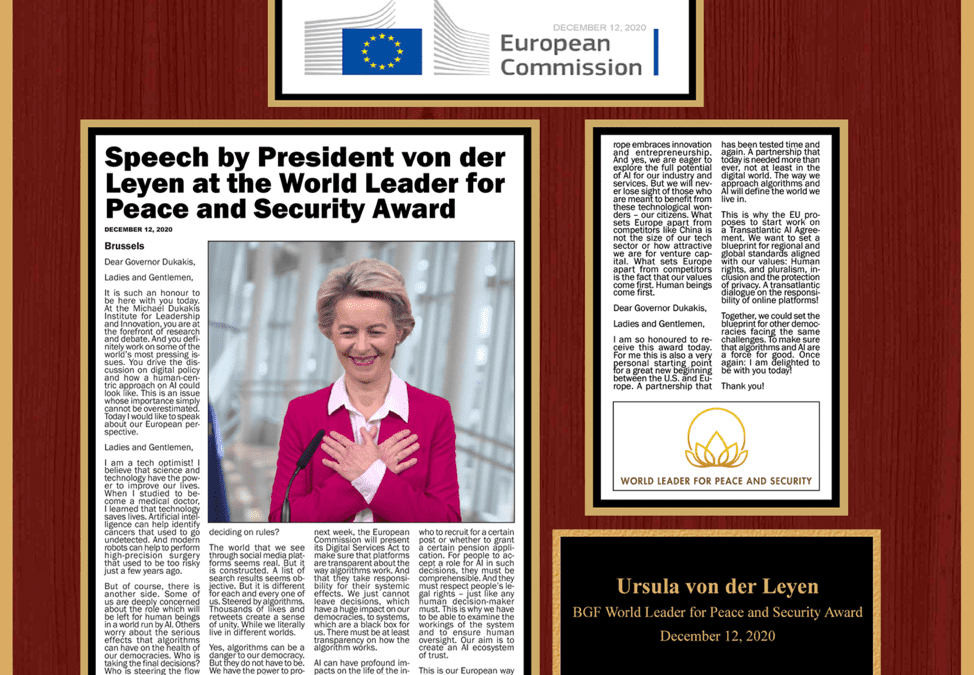
by Editor | Sep 11, 2022 | Global Alliance for Digital Governance
U.S. President Joe Biden, announced on Friday, Sept 2, the winners of a $1B economic development competition and announced the recipients for projects in areas like clean energy, tech, and AI. 21 winners will receive grants of $25M to $65M.
Additionally, private sector companies and local organizations are investing in The “Build Back Better Regional Challenge” is a program under the $1.9T American Rescue Plan, a stimulus package signed by President Biden in March.
AI projects included: A Georgia Tech Research Corporation coalition awarded $65M for AI efforts across Georgia’s industrial sectors and The Southwestern Pennsylvania New Economy Collaborative will receive $62.7M for projects in robotics and autonomy.
These developments of economic stimulation in AI reinforces the White House’s commitment to AI and if you are not already aware of AI.gov it is an important site which provides a wealth of information – from policy documents and strategies, to applications of AI, to the latest news and updates from the agencies and federal advisory boards helping shape the activities of the National AI Initiative. Created by Congress, the National AI Initiative seeks to sustain U.S. leadership in AI research and development, ensure the United States leads the world in the development and use of trustworthy AI in the public and private sectors, and prepare the present and future U.S. workforce for the integration of AI systems across all sectors of the economy and society.
The Global Alliance for Digital Governance (GADG) was established through a collaboration of the Boston Global Forum and World Leadership Alliance-Club de Madrid at the Policy Lab on September 7-9, 2021.
GADG do:
Coordinate resources: governments, international organizations, corporations, think tanks, civil society, and influencers for AI and a digital sphere for good, to make these resources more effective, to synthesize and maximize their impact, and to create more implementation-oriented conferences.
Protect fundamental values and standards proposed in Social Contract for the AI Age, in AI International Accord and in the book Remaking the World – Toward an Age of Global Enlightenment.
https://www.forbes.com/sites/cindygordon/2022/09/03/usa-white-house-president-joe-biden-advances-regional-innovation-in-cleantech-energy-and-ai/?sh=72c810b519bc
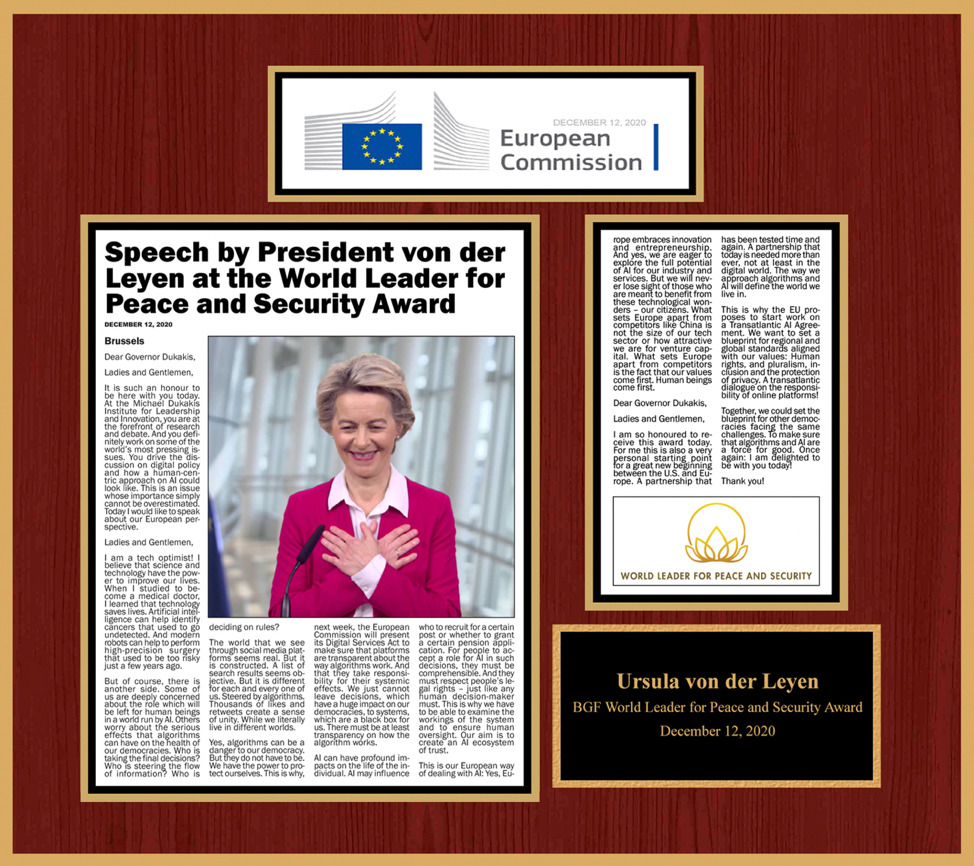
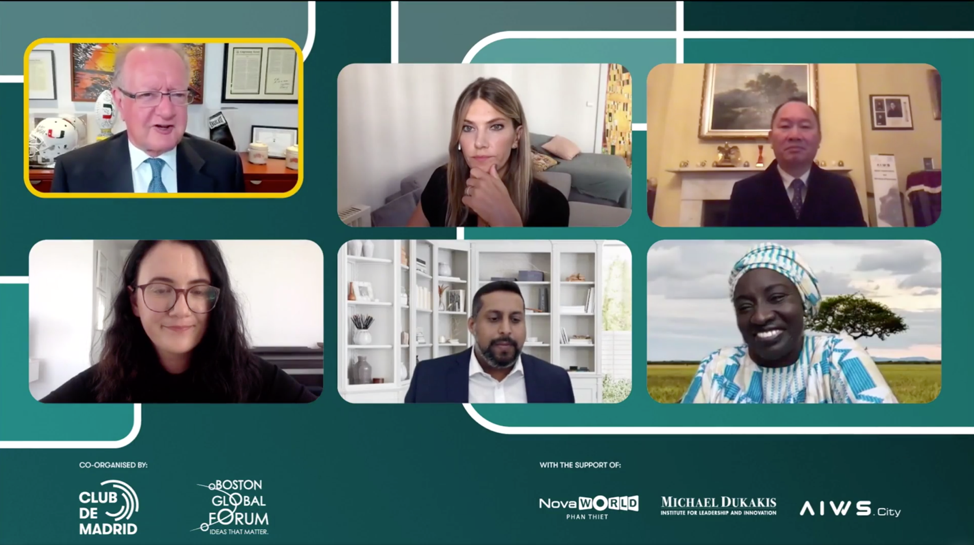
by Editor | Sep 5, 2022 | Global Alliance for Digital Governance
On September 16, 2022, Special Competitive Studies Project (SCSP) will be hosting the Global Emerging Technology Summit. The purpose of the Summit is to bring together government and private sector leaders from the United States and our staunchest allies and partners to ensure that emerging technologies help advance freedom, strengthen democracies, and protect the rules-based order.
Alongside a series of cutting-edge tech demos, the day’s sessions will shed further light on the future of geopolitics, democracy, and technology. Last week SCSP announced a remarkable lineup of speakers, including Jake Sullivan, Assistant to the President for National Security Affairs, Eva Kaili, VP of the European Parliament, and Sir Alex Younger, former Chief of the UK’s Secret Intelligence Service (MI6). This week, SCSP was thrilled to announce more speakers: Jack Clark, Co- founder of Anthropic AI; Stacey Dixon, Principal Deputy Director of National Intelligence; Anshu Roy, CEO of Rhombus; Wendy R. Sherman, Deputy Secretary of State; Eric Schmidt, SCSP Chair; Henry Kissinger, former U.S. Secretary of State; and H.R. McMaster, Lieut. Gen., U.S. Army (retired), Senior Fellow, Hoover Institution.
The Global Alliance for Digital Governance (GADG) was established through a collaboration of the Boston Global Forum and World Leadership Alliance-Club de Madrid at the Policy Lab on September 7-9, 2021.
GADG do:
- Coordinate resources: governments, international organizations, corporations, think tanks, civil society, and influencers for AI and a digital sphere for good, to make these resources more effective, to synthesize and maximize their impact, and to create more implementation-oriented conferences.
- Protect fundamental values and standards proposed inSocial Contract for the AI Age, inAI International Accord and in the book Remaking the World – Toward an Age of Global Enlightenment.











